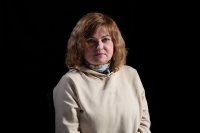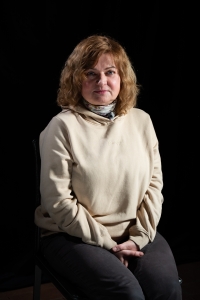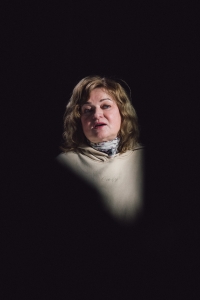Beata Iwona Wojnarowska
* 1963
-
"The first in our family was my younger sister Renata. At that time, she lived near the Ukrainian border. After the accident in Chernobyl, she started having problems with her thyroid gland. By working in Greece for some time during that period, she was able to document that she got thyroid cancer as a result of the Chernobyl disaster. She was then treated free of charge in Athens at a special clinic, also thanks to the fact that she managed to prove that her illness was obviously related to what happened in Chernobyl. He has to go for examinations every year. Her cancer has already returned twice. She was hospitalized twice in Athens. My son - it used to be said that children should spend as much time as possible in the fresh air, so we left him in the garden in his stroller, he was still tiny then. He was out practically all the time. After three to four years, he started having problems with his thyroid gland. In the end, they removed it from him. He has to take medicine all his life because he has no thyroid gland. The fact that he was operated on saved him, but he has health complications because of it, since the function of the thyroid gland is to regulate processes in the whole body. So the Chernobyl accident affected our family through these two cases."
-
"For the longest time, I was with the ensemble in America and Canada. I spent over half a year there, so imagine when you miss so much school. At that time, I had very difficult exams at the end of the school year. Despite this, I was always happy when I was on the road with the ensemble. We even received allowances and, like good children, we tried to help our parents - we either brought home the money we had saved or bought them some kind of gift. I remember how I once brought a big carpet home to them, I was 13 years old at the time. I traveled by bus with that carpet for three whole months. At that time, we did not know what to do with so much earnings, and we did not even know how to calculate the value of that money. We had all the goods on tickets, there were few goods and everything seemed so gray. There, on the other hand, they had a varied menu and everything was colorful. It often happened that if someone was not used to it and went to a department store for the first time, where, unlike Poland or Czechoslovakia, there was also a self-service, they left with the goods without paying. People just brought things out because they thought it was okay. Unpleasant situations then arose, because when passing through the security devices, the goods whistled, to which the security asked where they had gone with it. As if those people don't know how to find themselves in that world."
-
"I was already going to school then, and I liked it a lot as a child. And you know why I liked it? Because thanks to that I didn't have to go to school. There was a shortage of food in Poland at that time, and if we wanted to get to it, we had to stand in long lines. We usually stood in line all day and night, sometimes two, sometimes even three days. We waited in front of the store to see if they would bring in some meat or other goods. We never knew in advance what goods would be brought into the store, so we always had grocery lists and lists handy just in case. In addition, everyone brought a chair to sit on or a blanket, just everything they needed. The whole family always took turns in the rows. Since the parents had to go to work during the day, they stood in lines at night. We kids stood in line during the day so we could skip school, which of course I liked as a kid. Along with waiting in line, friendships were born - some of which I still maintain today. You could say that a lively social life developed there, because we supported and helped each other in moments when one of us had to run away from the council and represented each other. And so, in addition to standing in line in front of a closed shop, strong friendships were born on the sidewalk."
-
Celé nahrávky
-
Bratislava, 09.03.2023
(audio)
délka: 02:07:35
Celé nahrávky jsou k dispozici pouze pro přihlášené uživatele.
The most important thing in life is to know how to cooperate
Beata Iwona Wojnarowska was born on May 31, 1963 in Mielec, located in the south-east of Poland. Already during her studies in elementary school, she began to devote herself to professional dancing within the regional folk ensemble of Rzeszowiac. With him, she completed hundreds of performances abroad and thus had the opportunity to travel to countries behind the Iron Curtain during the period of communism. In her last year of high school, she experienced the assassination of Pope Ján Pavol II. and a few months later the declaration of martial law in Poland. After repeatedly failing to get into medicine due to a bad personnel report, she decided to move to Bratislava, where she married her childhood friend. After the birth of her son, she started working in the field of tourism - for several years she accompanied tourists around Bratislava, later she worked for a Polish travel agency as a delegate in Greece. For more than ten years, she was an active member of the Polish Club - an association of Poles and their friends in Slovakia, where she held the position of vice-president and later president. After leaving the post of president of the Polish Club, she worked for several years in the government evaluation commission. Since 2002, she has been in private business in the field of tourism - she is the owner of the travel agency GT-Express, where she still works today.


